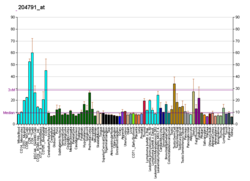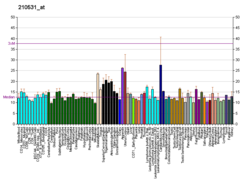The testicular receptor 2 (TR2) also known as NR2C1 (nuclear receptor subfamily 2, group C, member 1) is protein that in humans is encoded by the NR2C1 gene. TR2 is a member of the nuclear receptor family of transcription factors.
Interactions
Testicular receptor 2 has been shown to interact with:
See also
References
- ^ GRCh38: Ensembl release 89: ENSG00000120798 – Ensembl, May 2017
- ^ GRCm38: Ensembl release 89: ENSMUSG00000005897 – Ensembl, May 2017
- "Human PubMed Reference:". National Center for Biotechnology Information, U.S. National Library of Medicine.
- "Mouse PubMed Reference:". National Center for Biotechnology Information, U.S. National Library of Medicine.
- "Entrez Gene: NR2C1 nuclear receptor subfamily 2, group C, member 1".
- Chang C, Kokontis J, Acakpo-Satchivi L, Liao S, Takeda H, Chang Y (Dec 1989). "Molecular cloning of new human TR2 receptors: a class of steroid receptor with multiple ligand-binding domains". Biochemical and Biophysical Research Communications. 165 (2): 735–41. doi:10.1016/S0006-291X(89)80028-2. PMID 2597158.
- Mu X, Chang C (Oct 2003). "TR2 orphan receptor functions as negative modulator for androgen receptor in prostate cancer cells PC-3". The Prostate. 57 (2): 129–33. doi:10.1002/pros.10282. PMID 12949936. S2CID 24134119.
- Hu YC, Shyr CR, Che W, Mu XM, Kim E, Chang C (Sep 2002). "Suppression of estrogen receptor-mediated transcription and cell growth by interaction with TR2 orphan receptor". The Journal of Biological Chemistry. 277 (37): 33571–9. doi:10.1074/jbc.M203531200. PMID 12093804.
- Li G, Franco PJ, Wei LN (Oct 2003). "Identification of histone deacetylase-3 domains that interact with the orphan nuclear receptor TR2". Biochemical and Biophysical Research Communications. 310 (2): 384–90. doi:10.1016/j.bbrc.2003.08.145. PMID 14521922.
- ^ Franco PJ, Li G, Wei LN (Aug 2003). "Interaction of nuclear receptor zinc finger DNA binding domains with histone deacetylase". Molecular and Cellular Endocrinology. 206 (1–2): 1–12. doi:10.1016/S0303-7207(03)00254-5. PMID 12943985. S2CID 19487189.
- ^ Franco PJ, Farooqui M, Seto E, Wei LN (Aug 2001). "The orphan nuclear receptor TR2 interacts directly with both class I and class II histone deacetylases". Molecular Endocrinology. 15 (8): 1318–28. doi:10.1210/mend.15.8.0682. PMID 11463856.
Further reading
- Chang C, Kokontis J (Sep 1988). "Identification of a new member of the steroid receptor super-family by cloning and sequence analysis". Biochemical and Biophysical Research Communications. 155 (2): 971–7. doi:10.1016/S0006-291X(88)80591-6. PMID 3421977.
- Lin DL, Wu SQ, Chang C (Apr 1998). "The genomic structure and chromosomal location of the human TR2 orphan receptor, a member of the steroid receptor superfamily". Endocrine. 8 (2): 123–34. doi:10.1385/ENDO:8:2:123. PMID 9704569. S2CID 23712655.
- Lee CH, Chinpaisal C, Wei LN (Sep 1998). "A novel nuclear receptor heterodimerization pathway mediated by orphan receptors TR2 and TR4". The Journal of Biological Chemistry. 273 (39): 25209–15. doi:10.1074/jbc.273.39.25209. PMID 9737983.
- Lee CH, Chinpaisal C, Wei LN (Nov 1998). "Cloning and characterization of mouse RIP140, a corepressor for nuclear orphan receptor TR2". Molecular and Cellular Biology. 18 (11): 6745–55. doi:10.1128/mcb.18.11.6745. PMC 109258. PMID 9774688.
- Yu Z, Lee CH, Chinpaisal C, Wei LN (Oct 1998). "A constitutive nuclear localization signal from the second zinc-finger of orphan nuclear receptor TR2". The Journal of Endocrinology. 159 (1): 53–60. doi:10.1677/joe.0.1590053. PMID 9795341.
- Franco PJ, Farooqui M, Seto E, Wei LN (Aug 2001). "The orphan nuclear receptor TR2 interacts directly with both class I and class II histone deacetylases". Molecular Endocrinology. 15 (8): 1318–28. doi:10.1210/mend.15.8.0682. PMID 11463856.
- Tanabe O, Katsuoka F, Campbell AD, Song W, Yamamoto M, Tanimoto K, Engel JD (Jul 2002). "An embryonic/fetal beta-type globin gene repressor contains a nuclear receptor TR2/TR4 heterodimer". The EMBO Journal. 21 (13): 3434–42. doi:10.1093/emboj/cdf340. PMC 126089. PMID 12093744.
- Hu YC, Shyr CR, Che W, Mu XM, Kim E, Chang C (Sep 2002). "Suppression of estrogen receptor-mediated transcription and cell growth by interaction with TR2 orphan receptor". The Journal of Biological Chemistry. 277 (37): 33571–9. doi:10.1074/jbc.M203531200. PMID 12093804.
- Inui S, Lee YF, Chang E, Shyr CR, Chang C (Feb 2003). "Differential and bi-directional regulation between TR2/TR4 orphan nuclear receptors and a specific ligand mediated-peroxisome proliferator-activated receptor alpha in human HaCaT keratinocytes". Journal of Dermatological Science. 31 (1): 65–71. doi:10.1016/S0923-1811(02)00152-4. PMID 12615366.
- Franco PJ, Li G, Wei LN (Aug 2003). "Interaction of nuclear receptor zinc finger DNA binding domains with histone deacetylase". Molecular and Cellular Endocrinology. 206 (1–2): 1–12. doi:10.1016/S0303-7207(03)00254-5. PMID 12943985. S2CID 19487189.
- Mu X, Chang C (Oct 2003). "TR2 orphan receptor functions as negative modulator for androgen receptor in prostate cancer cells PC-3". The Prostate. 57 (2): 129–33. doi:10.1002/pros.10282. PMID 12949936. S2CID 24134119.
- Li G, Franco PJ, Wei LN (Oct 2003). "Identification of histone deacetylase-3 domains that interact with the orphan nuclear receptor TR2". Biochemical and Biophysical Research Communications. 310 (2): 384–90. doi:10.1016/j.bbrc.2003.08.145. PMID 14521922.
- Lin YL, Wang YH, Lee HJ (Nov 2006). "Transcriptional regulation of the human TR2 orphan receptor gene by nuclear factor 1-A". Biochemical and Biophysical Research Communications. 350 (2): 430–6. doi:10.1016/j.bbrc.2006.09.061. PMID 17010934.
This article on a gene on human chromosome 12 is a stub. You can help Misplaced Pages by expanding it. |
| Transcription factors and intracellular receptors | |||||||||||||||||||||||||||||||
|---|---|---|---|---|---|---|---|---|---|---|---|---|---|---|---|---|---|---|---|---|---|---|---|---|---|---|---|---|---|---|---|
| |||||||||||||||||||||||||||||||
| |||||||||||||||||||||||||||||||
| |||||||||||||||||||||||||||||||
| |||||||||||||||||||||||||||||||
| |||||||||||||||||||||||||||||||
| see also transcription factor/coregulator deficiencies | |||||||||||||||||||||||||||||||






